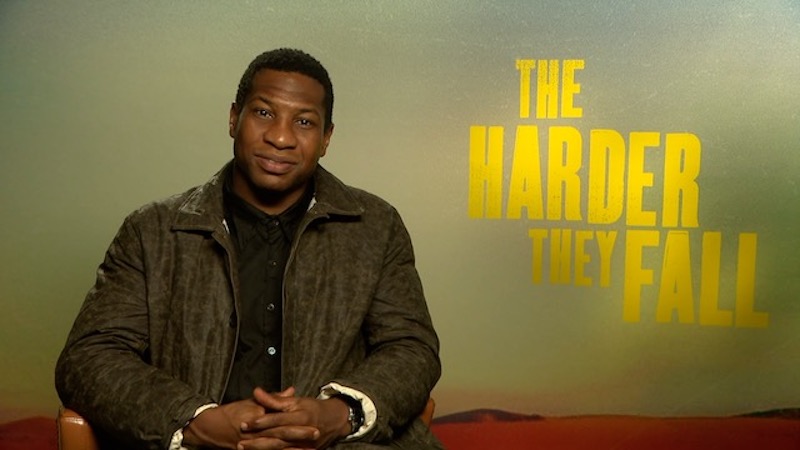The Harder They Fall is now streaming on Netflix and the violent western is led by Jonathan Majors, who puts on a brilliant performance as Nat Love.
“When outlaw Nat Love (Jonathan Majors) discovers that his enemy Rufus Buck (Idris Elba) is being released from prison he rounds up his gang to track Rufus down and seek revenge,” says the official synopsis. “Those riding with him in this assured, righteously new school Western include his former love Stagecoach Mary (Zazie Beetz), his right and left hand men — hot-tempered Bill Pickett (Edi Gathegi) and fast drawing Jim Beckwourth (R.J. Cyler)—and a surprising adversary-turned-ally. Rufus Buck has his own fearsome crew, including “Treacherous” Trudy Smith (Regina King) and Cherokee Bill (LaKeith Stanfield), and they are not a group that knows how to lose.”
ComingSoon Editor-in-Chief Tyler Treese spoke with The Harder They Fall star Jonathan Majors about the film’s theme of cyclical trauma, his thoughts on westerns, and more.
Tyler Treese: The true story of Nat Love is quite remarkable, and I really loved your version of him in the film. Can you discuss your preparation and approach to the role just because it is based on a real person?
Jonathan Majors: I’ll say approach just because preparation is the same for everybody, for any character I play, but the approach to that was something that I found early on is that he sees the world like a 10-year-old boy because of what happened to him when he was such a kid. That the rest of development is something that really became clear to me, and he moved through the world from that hurt because that’s what he had to protect. If you move too far away from it, he would make himself vulnerable in that way. That vulnerability was so great that all he could do is live a life in order to protect it. Ultimately, that protection would come and the redemption of taking the life, uh, to give himself security of the person who violated him and his family at such a young age.
You did a western before called Hostiles with Christian Bale, and now that you’ve gotten to do two very different takes on the genre, what do you find so interesting about this time period?
The time period ebbs and flows a bit. It’s about a hundred years in which I believe a proper western can be made. As soon as literally the westerns kind of end when trains come, the steam engines come, the western falls off because that’s no longer the world. You know what I mean? It’s no longer the world as far as like our classical western. But what I enjoy about it is that it is just man and nature, right? Human beings and nature. Because of that, you find that every character has to explore their own nature. That’s what every western is about, right?
Your hero, your heroes, and villains exploring their own nature without the cage of society, because out on the frontier, things haven’t been established yet. So everyone’s fighting for position. The only thing they can listen to, the only thing that gives them instructions, the only thing that can coach them on how to establish a civilization is what they feel on the inside. So everyone’s very, very feral and very natural in a way. I enjoy that wildness of the human spirit. It’s not as cultivated as other times and other genres.
You had a great point about Nat kind of seeing the world as a 10-year-old due to the position he was put in. The film kind of shows this kind of cyclical trauma. That is a really powerful theme we see. Can you speak to just the situation he’s put in and how it’s kind of repeating itself?
Yeah. There is a cycle, and I think that’s why our twist or whatever you can call it, but that’s why our final scene, when it all goes down, is so troubling because of the cycle Nat is not aware of until that moment, which is why we have a scene is because it is the hamartia of that moment that makes the whole film makes sense in a way you go, “Oh, wow. Oh no.” You know that’s incredible, and he doesn’t know he’s in a cycle, which is to the western genre idea. It lends itself more towards the Greek tragedies. That these people are dealing with fate and unknown sources because there’s no government, so what is it that’s pushing and pulling these people? Yes, their own moral compass, but also there’s something greater and they’re in conversation with it or running from it, or being driven by it unbeknownst to them. That really comes to a head in that final moment.










